译林牛津版高中英语模块1教案全套
- 格式:docx
- 大小:374.06 KB
- 文档页数:30
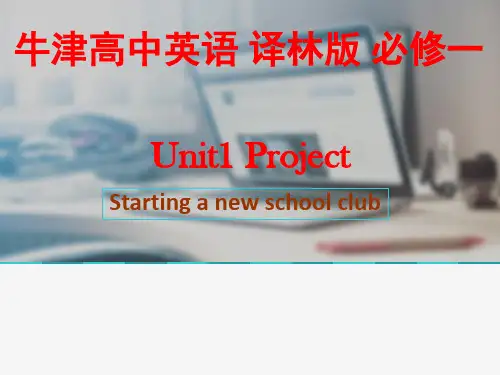
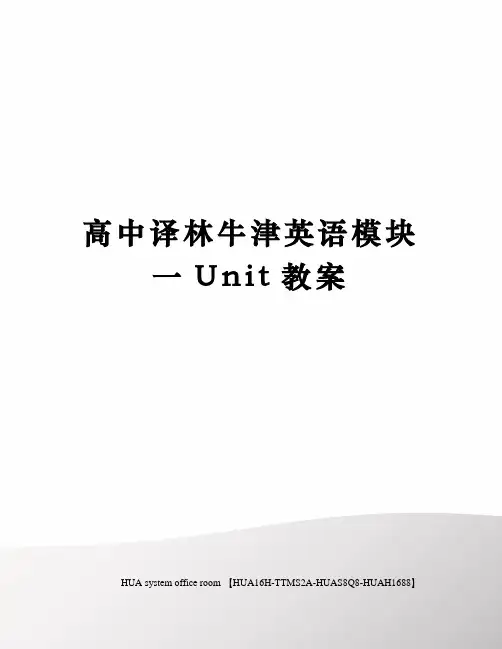
高中译林牛津英语模块一U n i t教案HUA system office room 【HUA16H-TTMS2A-HUAS8Q8-HUAH1688】Module1 Unit1教学设计课题 AWE M1 U2 主备人邱东课时主备教案课型 Welcome + WordpowerLearning objectives:By the end of this period, students will be able to1. enlarge their own knowledge by knowing the differences between American English and British English in pronunciation, grammar, vocabulary and spelling;2. improve their spoken skills by describing their own experiences or speaking about what they have heard or seen in the past tense;3. be aware of the sense of language by learning some English colloquialisms. Focus of the lesson:1. relations between parents and teenagers2. differences between American English and British English3. different colloquialismsPredicted area of difficulties:1. how to improve the relationships between parents and teenagers if they are not so good;2. how to use colloquialisms properly.Learning aids:1. PPT2. blackboardLearning procedures:课型 Reading(I)Learning objectives:By the end of this period, students will be able to1. know more information about American family life;2. learn the basic skills of how to read a play and act out the play with the help of a teacher;3. form a positive attitude towards growing pains. Focus of the lesson:1. characteristics of a play;2. a performance of a play;Predicted area of difficulties:How to act in the play?Learning methods:1. PPT2. blackboardLearning procedures:课型 Reading(II)Learning objectives:By the end of this period, students will be able to1. write out the transformation of the key words and phrases correctly;2. use the key words properly in relevant tasks;3. know some words and phrases in a play;4. raise the awareness of learning new words or phrases in a context. Focus of the lesson:1. usage of the key words and expressions;2. verb tenses in a play and some stage instructions.Predicted area of difficulties:1. the usage of the following words and phrases ‘follow’ ‘be supposed to do’ ‘tolerate ‘deserve’ and so on;2. the proper usage of relative adverbs.Learning aids:1. PPT2. blackboardLearning procedures:Grammar&UsageLearningobjectives:Bytheendofthisperiod,studentswill be able to1. better understand the grammatical functions of attributive clauses;2. use prepositions +which / whom3. use relative adverb s ‘when’ ‘wh ere’ ‘wh y’ ;4. enjoy the neatness & beauty of attributive clauses comparing them with simple sentences.Focus of the lesson:1. the usage of relative adverbs;2. the exchange of “prepositions +which” and relative adverbs. Predicted area of difficulties:1. the usage of relative adverbs;2. how to distinguish relative pronouns and relative adverbs.Learning aids:1. PPT2. blackboardLearning procedures:课型 TaskLearning objectives:At the end of this lesson, students will be able to:1. understand the main points and the mood of the writer by reading four diary entries.2. know how to write a letter for advice and a letter of reply.3. know a better way to solve the problem between teenagers and parents.Focus of the lesson:Reading for key points and main idea.Predicted learning difficulties:How to get the key points in a diaryLearning aids:1. PPT2. blackboardLearning procedures:课型 ProjectLearning objectives:By the end of this period, students will be able to:1. know what are growing pains;2. identify the three types of changes of growing pains;3. learn to deal with the changes properly and develop healthily bothphysically and mentally.Focus of the lesson:1. three kinds of changes;2. proper ways to deal with them; Learning aids:1. PPT2. blackboardLearning procedures:。
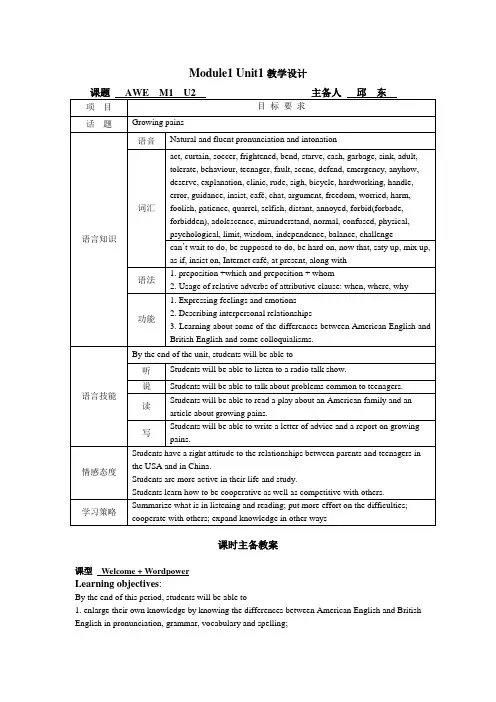
Module1 Unit1教学设计课时主备教案课型Welcome + WordpowerLearning objectives:By the end of this period, students will be able to1. enlarge their own knowledge by knowing the differences between American English and British English in pronunciation, grammar, vocabulary and spelling;2. improve their spoken skills by describing their own experiences or speaking about what they have heard or seen in the past tense;3. be aware of the sense of language by learning some English colloquialisms.Focus of the lesson:1. relations between parents and teenagers2. differences between American English and British English3. different colloquialismsPredicted area of difficulties:1. how to improve the relationships between parents and teenagers if they are not so good;2. how to use colloquialisms properly.Learning aids:1. PPT2. blackboard课型Reading(I)Learning objectives:By the end of this period, students will be able to1. know more information about American family life;2. learn the basic skills of how to read a play and act out the play with the help of a teacher;3. form a positive attitude towards growing pains.Focus of the lesson:1. characteristics of a play;2. a performance of a play;Predicted area of difficulties:How to act in the play?Learning methods:1. PPT2. blackboard课型Reading(II)Learning objectives:By the end of this period, students will be able to1. write out the transformation of the key words and phrases correctly;2. use the key words properly in relevant tasks;3. know some words and phrases in a play;4. raise the awareness of learning new words or phrases in a context.Focus of the lesson:1. usage of the key words and expressions;2. verb tenses in a play and some stage instructions.Predicted area of difficulties:1. the usage of the following words and phrases …follow‟ …be supposed to do‟ …tolerate …deserve‟and so on;2. the proper usage of relative adverbs.Learning aids:1. PPT2. blackboardLearning procedures:课型Grammar & UsageLearning objectives:By the end of this period, students will be able to1. better understand the grammatical functions of attributive clauses;2. use prepositions +which / whom3. use relative adverb s …when‟ …wh ere‟ …wh y‟ ;4. enjoy the neatness & beauty of attributive clauses comparing them with simple sentences. Focus of the lesson:1. the usage of relative adverbs;2. the exchange of “prepositions +which” and relative adverbs.Predicted area of difficulties:1. the usage of relative adverbs;2. how to distinguish relative pronouns and relative adverbs.Learning aids:1. PPT2. blackboardLearning procedures:课型TaskLearning objectives:At the end of this lesson, students will be able to:1. understand the main points and the mood of the writer by reading four diary entries.2. know how to write a letter for advice and a letter of reply.3. know a better way to solve the problem between teenagers and parents.Focus of the lesson:Reading for key points and main idea.Predicted learning difficulties:How to get the key points in a diaryLearning aids:1. PPT2. blackboardLearning procedures:课型ProjectLearning objectives:By the end of this period, students will be able to:1. know what are growing pains;2. identify the three types of changes of growing pains;3. learn to deal with the changes properly and develop healthily both physically and mentally.Focus of the lesson:1. three kinds of changes;2. proper ways to deal with them;Learning aids:1. PPT2. blackboardLearning procedures:。
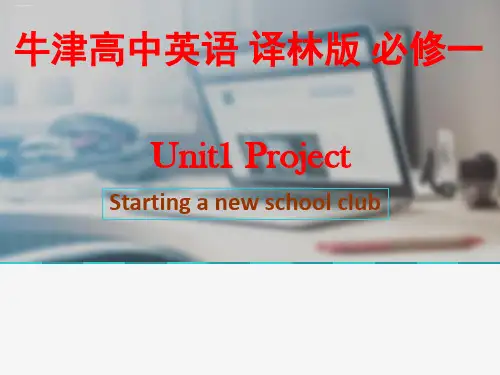
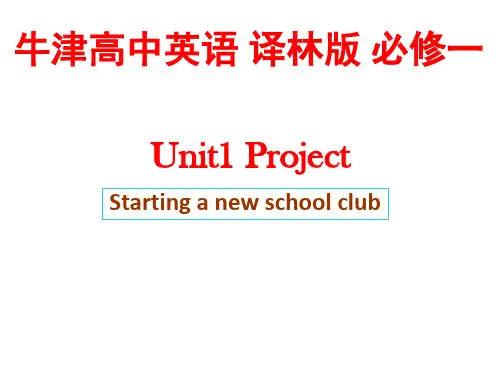
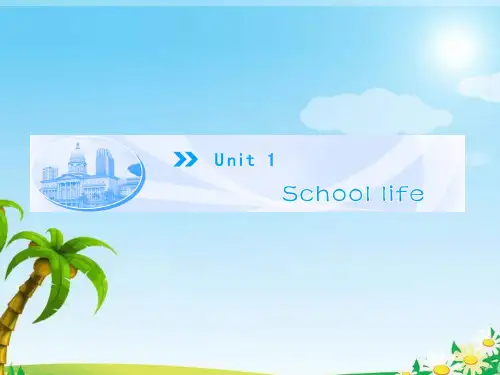
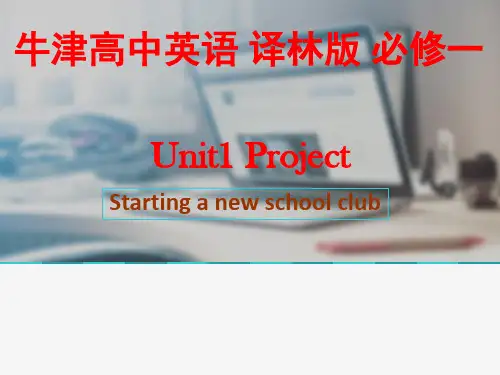
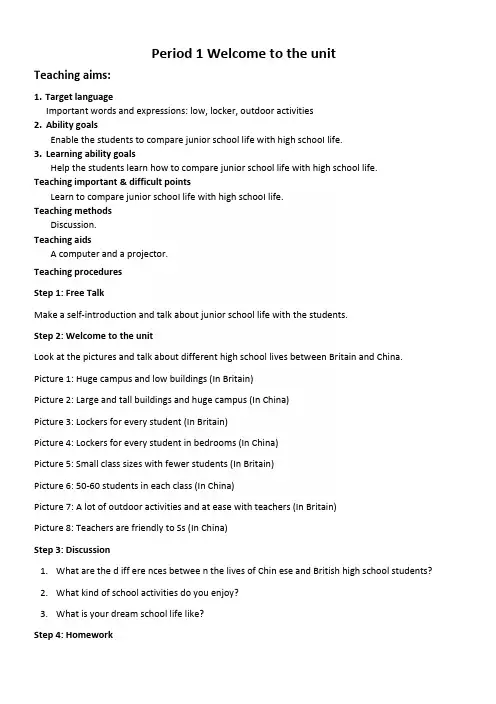
Period 1 Welcome to the unitTeaching aims:1.Target languageImportant words and expressions: low, locker, outdoor activities2.Ability goalsEnable the students to compare junior school life with high schooI life.3.Learning ability goalsHelp the students learn how to compare junior school life with high school life.Teaching important & difficult pointsLearn to compare junior schooI life with high schooI life.Teaching methodsDiscussion.Teaching aidsA computer and a projector.Teaching proceduresStep 1: Free TalkMake a self-introduction and talk about junior school life with the students.Step 2: Welcome to the unitLook at the pictures and talk about different high school lives between Britain and China. Picture 1: Huge campus and low buildings (In Britain)Picture 2: Large and tall buildings and huge campus (In China)Picture 3: Lockers for every student (In Britain)Picture 4: Lockers for every student in bedrooms (In China)Picture 5: Small class sizes with fewer students (In Britain)Picture 6: 50-60 students in each class (In China)Picture 7: A lot of outdoor activities and at ease with teachers (In Britain)Picture 8: Teachers are friendly to Ss (In China)Step 3: Discussion1.What are the d iff ere nces betwee n the lives of Chin ese and British high school students?2.What kind of school activities do you enjoy?3.What is your dream school life like?Step 4: Homework1.Try to make a careful plan for your high school study.2.Preview the Reading.Teachi ng Post-descriptio n:Periods 2-5 Reading School life in the UK Teaching aims:The General Idea of This Period:This period is about the reading of the passage School Life in the UK. It will help you to learn more about school life in the UK and the d iff ere nces betwee n that in the UK and in China. Meanwhile you can learn some reading strategies such as skimming and scanning.Teaching Aims:1.Train the students" reading ability.2.Learn some useful words and expressions.3.Lear n more about school life in the UK and the d iff ere nces betwee n school life in the UK and in ChinaTeaching Important Points:1.Help the students to understand the passage better.2.Learn and master some important words and phrases in this period.Teaching Difficult Point:1.How to help the stude nts improve their readi ng ability and un d erst a nd the passage better.2.How to master the important Ianguage points in this passage.Teaching Methods:1.Fast reading to get the general idea of the text.2.Careful reading to understand the passage better.3.Discussion to help the students understand what they've learned better.4.Explanation to help the students master some language points.Teaching Aids:1- A tape recorder.2.A multimedia.Teaching Procedures:Step 1 Greetings1.Greet the whole class as usual.2.Check their home work.Step 2 Reading1- DiscussionT: Last time we learned about some differences between Chinese and British school life. First lets work in groups and have a discussion about the schooI life in the UKAsk the students to have a discussion in groups.T: Today we are going to read a passage by Wei Hua, who once studied in the UK. She willgive us some detailed information about the schooI life in the UK.2.Reading strategyReading strategies: skimming and seanningA. Skimming: We skim a text when we want to get a general idea of what it is about. We look at the titles and headlines, the first and last sentences of paragraphs and the first and last paragraphs as well as pictures and charts to guess what the text is about.B・Scanning: When we want to find certain information in a text quickly, we scan the text for key words and phrases, dates, numbers, etc. We do not need to read the whole text word by word.3.Skimming and scanning (Practice)T: Now let's skim the text quickly and tell the topics mentioned in the text.Next lets scan the text and answer these questions. Hand up when you get the answers.(T show the questions on the screen.)1.How long did Wei Hua stay in Britain?2.What was the name of Wei Hua's class teacher?3.What did Wei Hua make in her art class?Suggested answers:1.For one year.2.Mr Heywood.3.A small sculpture.4.Do some true or false exercises.1.Wei Hua's favourite teacher was Mr Heywood.2.Most British classes have fewer than thirty students.3.Wei Hua had more homework in her school in China.4.It was very expensive for Wei Hua to communicate with her parents.5.In the UK, students can choose to stop studying any subject.6.The cake made by Wei Hua did not taste good.5.Read the article again carefully and answer the following questions.1.According to the headmaster, what should the students spend much time on?2.Why was it a struggle for Wei Hua to remember the names of her classmates?3.Why did Wei Hua find her homework difficult at first?4.Who gave Wei Hua a lot of support in her studies?5.How did Wei Hua man age to improve her En glish?6.What do the British like eating at the end of dinner?Suggested answers:1.Study.2.Because they had d if fere nt stude nts in some classes.3.Because all the homework was in English.4.All her teachers5.She used English every day and spent an hour each day reading English books in the library.6.Desserts.6.Detailed readingNow lets read the passage again carefully to check the answers. Underline the new words in the text. Meanwhil巳some more questions are waiting for you.(First go through the questions so that they know what to find out. Give them a chanee to discuss with their partners if they want)1.What time do British Schools usually begin?2.What time do they usually end?3.On average, how many students are there in a class in the UK?4.Why did Wei Hua find her homework difficult at the beginning of her study in the UK?5.On Tuesdays, what did Wei Hua do in evening?6.What do British students usually eat after their main meal?7.Which British city did Wei Hua go to?(Write down the new words the students have just listed.)7.ConsolidationAsk the Ss to talk about the topics mentioned in the text and then fill in the forms.6. Careful reading and practiceAsk the Ss to match the words with correct definitions.Step 3: Further discussionAsk the Ss to talk about the two questionsStep 4: Language points :1.experiencen. [ U] He is an old teacher with much experienee.c.f. He is an experienced teacher.n. [C] My grandfather likes to tell us about his wonderful experiences in the war time.v. During the war time , my grandfather experienced a hard time .2.as : since : becauseI could get up an hour later than usual as schools in China begin before 8 a. m .I felt lucky as all my teachers were very helpful.My English improved a lot as I used En glish every day •Cooking was really fun as I learned how to buy, prepare and cook food •3 sound link-v.The music sounds so pleasant •That sounds a good idea .I hope I dorft sound as if Km criticizing you .It sounded like a train going under my house .4.averagen. The average of 4, 5 and 9 is 6.These marks are well above / below average .On (the ) average.We fail one student per year on average .adj. The average age of the students is 16 in our class .Rainfall is about average for the time of year.v. This car averages 40 miles to the gallon .Meals average out at $ 10 per head .5.attend : go to6.earn : get something because you have done something good.7.challenging : difficult in an interesting way that tests your ability8.extra : more than usual9.prepare : make something ready10.desserts : sweet food eaten at the end of a meal •11.Present attributive clauses and illustrate them to the students:I sat next to a girl whose name was Diane •Step 5: practice, Listening and Consolidation1.Do practice and review some useful words in the text.2.Listen to the tape. You may follow it while listening and please pay attention to your pronun ciati on.(The teacher plays the tape for the students to listen. After that the teacher gives the students a few minutes to read aloud the passage. Mean while, the teacher asks the stude nts to try to remember some details.)3.Turn to Page 5.Lets do Exercise E. Complete the letter to Wei Hua using the words below. Suggested answers:1.experienced2.fond3.literature4.dessert5.struggle6.respect7.encouragementStep 6: Discussion1.Should students learn more Ianguages? Why or why not?2.What subjects would you like to take if you could choose? Why?3.What subjects do you like best and least?4.Do you think we should learn more foreign Ianguages?Step7: SummaryReading strategies: skimming and sea rming.Step 8: Homework1.Read the passage after class and get familiar with these Ianguage points.2.Have a further discussion with your partners about the topic in Part F.Teachi ng Post-descripti on:Periods 6-7 Word powerTeaching aims:1.Target languagecan tee n, lecture hall, gym, beam, barbell, skipping rope, dumb-bellWhat is the quickest way to …P6If I walk toward •… I can then •… walk past... and …P62.Ability goalsEnable the students to learn the words and expressions about school facilities.3.Learning ability goalsHelp the students learn how to master the words and expressions about school facilities.Teaching important points:Learn the words about school facilities.Teaching methods:lllustration, definition and translation.Teaching aids:A blackboard and Multimedia.Teaching proceduresStepl: Lead inCheck the homework.Step 2: Vocabulary LearningAsk the students to think about the following topic.Activity 1: Learning the names of school buildingsAsk the students to give the Chinese meaning of the names of the buildings.Activity 2: Finding the wayReview the expressions of asking and answering the way.1.How to ask the way:Excuse me, which is the quickest way to ... ?Excuse me, could you tell me the way to ... ?Excuse me, how can get to ... ?2.How to answer the way then?Turn left / right, and walk straight on. Turn right at the end of the first / second crossing, you will find it on your left / right. You can't miss it.Walk toward / past •…and then walk between ... and ... You will find …right next to …3.Ask the students to do Part B.Sample description:Suppose Wei Hua is at the door of the can tee n. First she should tur n right, walk to the first crossing and turn left, walk straight on to the end of the road, get the book she wants and then retur n from the same way to the can tee n, walk on till the end of the road. Classroom 4 is on her left.Activity 3: Finishing the noteAsk the students to do Part C on page 7.Step 3: Vocabulary ExtensionThere are many pieces of equipment there and often there are instructors.Now please do Part D by yourselves.Then check the answers.1.climbing bars;2. rings;3. dumb-bell;4.beam;5. skipping rope6. basketball court;7. barbell;8. mat Step 4: Homework1- Try to learn more words about school facilities.2.Preview the Grammar and usage.Teachi ng Post-descripti on:Periods 8-11 Grammar and usageThe Attributive Clause (1)Teaching Aims:To learn the usages of the noun clauses and practise using them.Important and Difficult Points:1.The basic usage of the relative pronouns and lear n to use them in d iff ere nt situations.2.How to help the students to learn the grammar efficiently.Teaching methods:Deduction to present the usage of the relative pronouns and then some exercises to consolidate what we have learned.Teaching aids:A blackboard and Multimedia.Teaching proceduresStepl: GreetingsStep2: PresentationLook at the picture at page8 and ask the students to speak out what they may think of.(Write down these three structures on the Bb or show them on the screen below the picture.)Adjective: a green teamPrepositional phrase: a team in greenAttributive clause: a team who were wearing greenConcept: Attributive clause modifies a noun in the same way as adjective or prepositional phrase does. The noun it mod讦ies is called an antecedent.Relative words:Read Part2 at page8. Attributive clauses are usually introduced by relative pronouns like which, that,who, whom, and whose, or relative adverbs like where, why and when. In the clause these relative words usually function as the following: (page8)Step3: PracticeRead the article at page9 and underline the attributive clauses you find in the article.Step 4: Relative pronounsRelative pronouns: that, which, who, whom and whose. Read this part at pagelO and grasp the usages of these relative pronouns.(show the screen) Then do the exercise at pagell・Step 5: ConsolidationFinish the exercises at page88Step 6: HomeworkComplete the Attributive Clause exercisesTeachi ng Post-descripti on:Periods 12-14 TaskTask Reporting school activities (1)Teaching goals1.Target languageUndersta nding a program: date, day, time, venue, eve nt / activity2.Ability goalsEnable the students to understand a program.3.Learning ability goalsHelp the students learn how to complete a timetable for a school program.Teaching important & difficult pointsHow to complete a timetable for a school program・Teaching methodsListe ning.Teaching aidsA recorder and a blackboard・Teaching proceduresStep 1: Revision and Lead-inCheck the homework and review the usage of relative pronouns.The relative pronouns of English are: who, whom, whose, which, and that. Now please finish the following exercises・Show the following.1.Don't talk about such things of _ you are not sure.A.whichB. whatC. asD. those2.The wolves hid themselves in the places ___ couldn*t be found.A. thatB. whereC. in whichD. in that3.The freezing point is the temperature _ water changes into ice.A. at WhichB. on thatC. in whichD. of what4.TH tell you _ he told me last week.A. all whichB. thatC. all thatD. which5.We're talking about the piano and the pianist_ were in the concert we attended last night.A. whichB. whomC. whoD. that6.The girl _ an English song in the next room is Tom*s sister.A. who is singingB. is singingC. sangD. was singing7.Those _ not only from books but also through practice will succeed.A. I ear n B・ whoC. that learnsD. who learn8.Any one _ this opinion may speak out.A. that againstB. that againstC. who is againstD. who are against9- Didn't you see the man _?A.I nodded just nowB.whom I nodded just nowC.I nodded to him just nowD.I nodded to just now10. Can you lend me the novel _ the other day?A. that you talkedB. you talked about itC・ which you talked with D. you talked aboutSample answers: 1-5 AAACD 6-10 ADCDCTalk about school programs with the students.Step 2: Understanding a programActivity 1: Ask the students to read the five points in Skills building 1 on page 12.Read the five points in Skills buildi ng 1 on page 12 and make sure what a program usually in eludes. Activity 2: Ask the stude nts to write dow n the n ames of mon ths and the seve n days of a week in abbreviati ons.Sample answers:Jan, Feb, Mar, Apr, May, Jun, Jul; Aug, Sep, Oct, Nov, DecMon, Tue, Wed, Thu, Fri, SatActivity 3: ListeningListen to the talk of a famous scientist and complete the timetable on page 12.Play the recording and then check the answers with the students.Step 3: Listening PracticeActivity 1: Completing a timetableAsk the students to read the instructions and the timetable・Then ask the students to listen to the tape and complete the timetable on their own. Check the answers as a class.Activity 2: Completing a note sheetAsk the students to read the instruct!ons on page 92 and listen to complete the exercises.Read the guideline on page 92. Then listen to the tape and complete the note sheet. Check the answers.Then ask the students to listen to the telephone conversation between Keling and her dad and complete the notes.Activity 3: Completing a storyAsk the students to read the story and the note sheet first, and then complete the story.Ask the students to read the completed story to check the answers.Step 4: SummaryToday we've learned a very useful skill, that is how to develop a school program. The most important thing in developing a program is to make a careful plan in advance.Step 5: HomeworkPlease work in groups and develop a program plan.Task Reporting school activities (2)Teaching goals1.Target languageComparing information.2.Ability goalsEnable the students to make decisions by comparing information.3.Learning ability goalsHelp the students learn how to make decisions by comparing information.Teaching important & difficult pointsCompare information to make decisions.Teaching methodsDiscussion and task-based activities.Teaching aidsA projector and some slides.Teaching proceduresStep 1: RevisionCheck the homework.Step 2: Lead-inGet the students to know how to compare information before making decisions.Ask the students to read the two points about comparing information before making decisions on page 14.Read the two points on the screen about how to make comparisons.Show the following on the screen.Oread all the information carefullyOmake as many comparisons as possibleStep 3: WritingActivity 1: Reading and comparing the information Ask the students to read the guidelines and the list of the seven books・Read the e-mail David Brown wrote to Yang Yan as fast as you can and find out what the main idea of the e-mail.Ask the students to compare the list of the seven books and the information given in the letter. Then read the e-mail again carefully, and find the information David Brown has provided about the book and complete the following chart.Show the following on the screen.Title: __________Author: __________Year: __________Price: __________Sample answers:Title: Including the word "Dynasties”Author: A famous professorYear: After 2007Price: below 20Then ask the students to compare the list of the seven books with the information given in the letter to find the clues.Activity 2: Writing a replyT: You've made a fight decision by comparing the information. Now please write back to David Brown for Yang Yan. When writing, please pay attention to the pattern of an e-mail・A sample e-mail:Dear David Brown,very glad to receive your e-mail. According to the information you provide about this history book, I have found it out for you. I have found there are seven books in the library about Chinese history. But only four of them in elude “Dyn asties11 in the title. On the back covers of them, I sawtheir prices and there were three of them left. Then in accordance with author and year, I found it out finally. It is The Rise of the Dynasties. You can order a copy of it soon.Best wishes,Yang YanStep 4: SpeakingActivity 1: Comparing the informationAsk the students to compare the information in the timetable with the school program on page 13. Ask the students to choose the five talks you can attend.Sample answers:1.School life in the USA2.Fighting pollution3.Staying in good health4.Australian pop songsActivity 2: ReportingAsk the stude nts to read the in struct! ons in Part B on page 15.Read the instructions in Part B first. And then work in pairs talking about the talks according to the program timetable on page 13 and the notes in Part A.Step 5: SummaryBy making comparisons, we can see clearly the similarities and chfferences between different information. Ifs one of the best ways to make correct decisions.Step 6: Homework1.Write an article in which you compare your study method with that of your classmate(s) and make your decisions.2.Preview Skills building 3 and Step3.Task Reporting school activities (3)Teaching goals1.Target languageWriting a notice.2.Ability goalsEnable the students to write a notice.3.Learning ability goalsHelp the students learn how to writer a notice.Teaching important & difficult pointsHow to write a notice.Teaching methodsDiscussion and task-based activities.Teaching aidsA projector and some slides.Teaching proceduresStep 1: RevisionCheck the homework・In the last period, we learned how to make decisions by comparing information.Step 2: Lead-inTo inform others, one of the ways it to put on notices. Then do you know what a notice is? How to write a notice? Now read the guidelines on page 16 and find out.Ask the students to read the notice given by the school library.Rread the notice from the school library. Point out the important information in it.Show the following:Event:Time:Reason:When to reopen:The new opening hours:Public holidays:Who gives the notice:Sample answers:Event: library closedDate: 15-17 SeptemberDay: next Wednesday, Thursday and FridayReason: the sports meeting will be heldWhen to reopen: Saturday (18th September)The new opening hours: Morn Fri: 8 am - 6 pmSat & Sunday: 10 am - 5 pmPublic holidays: closedWho gives the notice: LibraryAsk the students to talk about how to make a notice attractive・Step 3: WritingAsk the students to read the guidelines in Step 3 on page 17.Write a notice to inform your classmates of the program you'll attend. Now read the guidelines on page 17 first.A sample notice:NoticeTalks in OctoberI am very glad to inform you that there are four talks to be held next month. The topics of them, respectively, are School life in the USA, Fighting pollution, Staying in good health and Australian pop songs. The places, the time and the speakers of the talks are as follows:School life in the USA: by a USA student; in Room 404, Building 1; at 3 p.m. on 13th Oct.Fighting pollution: by a Scientist; in Room 105, Building 2; at 9 a.m. on 19th Oct.Staying in good health: by a doctor; in Room 306, Building 4; at 2.30 p.m. on 21st Oct.Australian pop songs: by a famous singer; in Room 303, Building 4; at 10 a.m. on 29th Oct. Thank you for your kind attention.Li MingmingStep 4: PracticeAsk the students to write a note.T: When we give someone information and the person may not be present, you can write a note. The note will help the person remember to do something・ Next please read the instructions on page 93 and then write a note.A sample note:Dear Mickey,It's a pity that you are out when I come to visit you. But it doesn*t matter. I invite you to pay a visit to me at our school. Here I leave you a note with our school map. When you walk through the school gate into the campus, you can see two paths on the two sides of the playground. Take the path on the left and you will pass by gym, library and teachers1 office. Seeing a beautiful river, you should cross the bridge over it. Then turn left and walk about 300 meters, you will reach Dorm 1, where I live. That's it. Wang JunStep 5 HomeworkWrite a notice based on the following information由于学校要举行运动会,原定于11月5日举行的期中考试将改在口月20日。

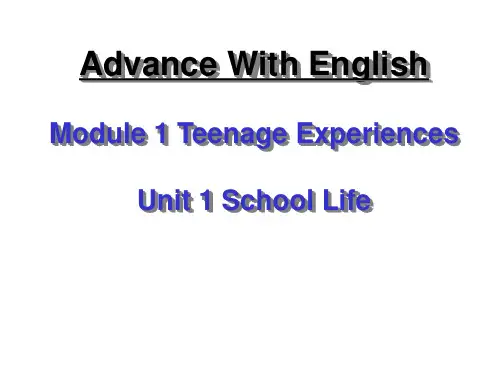
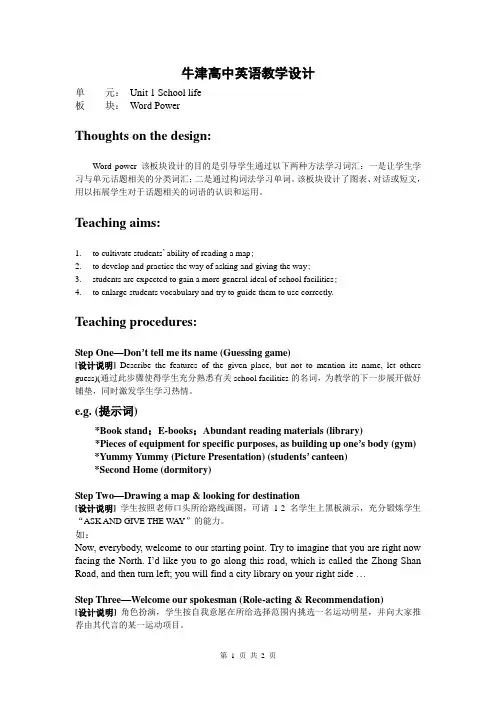
牛津高中英语教学设计单元:Unit 1 School life板块:Word PowerThoughts on the design:Word power 该板块设计的目的是引导学生通过以下两种方法学习词汇:一是让学生学习与单元话题相关的分类词汇;二是通过构词法学习单词。
该板块设计了图表、对话或短文,用以拓展学生对于话题相关的词语的认识和运用。
Teaching aims:1.to cultivate students’ ability of reading a map;2.to develop and practice the way of asking and giving the way;3.students are expected to gain a more general ideal of school facilities;4.to enlarge students vocabulary and try to guide them to use correctly.Teaching procedures:Step One—Don’t tell me its name (Guessing game)[设计说明] Describe the features of the given place, but not to mention its name, let others guess)(通过此步骤使得学生充分熟悉有关school facilities的名词,为教学的下一步展开做好铺垫,同时激发学生学习热情。
e.g. (提示词)*Book stand;E-books;Abundant reading materials (library)*Pieces of equipment for specific purposes, as building up one’s body (gym) *Yummy Yummy (Picture Presentation) (students’ canteen)*Second Home (dormitory)Step Two—Drawing a map & looking for destination[设计说明] 学生按照老师口头所给路线画图,可请1-2名学生上黑板演示,充分锻炼学生“ASK AND GIVE THE WAY”的能力。
高中译林牛津英语模块一U n i t教案集团文件版本号:(M928-T898-M248-WU2669-I2896-DQ586-M o d u l e1U n i t1教学设计课题 AWE M1 U1 主备人仇晓荣注:目标要求可参阅南京外国语学校仙林分校《英语教学实施纲要》第四部分“目标内容”中的相关描述。
课时主备教案课型 Welcome & Word powerLearning objectives:By the end of this period, students will be able to1. enlarge their own vocabulary by knowing the exact names of all kinds of school facilities and activities;2. improve their spoken skills by describing their favorite activities at school and showing others ways;3. be aware of cultural differences by comparing school life in China and in Britain.Focus of the lesson:1. the names of school facilities2. different expressions to ask and show waysPredicted area of difficulties:using locative prepositions and prepositional phrases properly Learning aids:1. PPT2. blackboardLearning procedures:课型 Reading(I)Learning objectives:By the end of this period, students will be able to1. know more information about the school life in Britain;2. learn to use two reading strategies: skimming and scanning;3. form a reasonable attitude to different ways of education. Focus of the lesson:1. skimming2. scanningPredicted area of difficulties:When and how to use skimming and scanning?Learning methods:1. PPT2. blackboardLearning procedures:课型 Reading(II)Learning objectives:By the end of this period, students will be able to1. write out the transformation and phrases of the key words correctly;2. use the key words properly in relevant tasks;3. use -ing form as subjects;3. get a basic idea of attributive clause;4. raise the awareness of learning new words or phrases in a context.Focus of the lesson:1. usage of the key words2. v–ing form as subjectsPredicted area of difficulties:1. the usage of the phrase ‘devote…to’ ‘attend’ phrases about ‘look’ and so on2. the proper usage of –ing form as subjectsLearning aids:1. PPT2. blackboardLearning procedures:课型 Grammar & UsageLearning objectives:By the end of this period, students will be able to1. understand the grammatical functions of attributive clauses;2. use relative pronouns ‘that’ ‘which’ ‘who’ ‘whom’‘whose’;3. enjoy the neatness and beauty of attributive clauses comparing them with simple sentences.Focus of the lesson:the usage of relative pronounsPredicted area of difficulties:1. the usage of relative pronounsLearning aids:1. PPT2. blackboardLearning procedures:课型 TaskLearning objectives:By the end of this lesson, students will be able to1. understand the dates, time, places in a program;2. know how to get the information by comparing;3. report his or her decision to the whole class. write a notice. Focus of the lesson:1. notes-taking by reading and listening2. Writing a noticePredicted learning difficulties:1.the understanding of all numbers appearing as time, date or day2. writing a noticeLearning aids:1. PPT2. tape and tape recorder Learning procedures:课型 ProjectLearning objectives:By the end of this period, students will be able to1. know what school clubs are like;2. work out with group members how to start a school club;3. learn the importance of teamwork.Focus of the lesson:1. getting to know what school clubs are like2.how to start a clubPredicted learning difficulties:1. the design of a school clubLearning aids:1. multi-media courseware(PPT)2. blackboardLearning procedures:。
牛津高一英语模快一Unit1Wordpower教案(译林牛津版高一英语必修一教案教学设计)Warming-up1. Present one of the school maps from the students’ repairing work. And encourage him or her to tell us how he or she found the way out on the first day. Encourage more students to think of the pattern drills and useful expressions they have learned in junior school:Do you have any difficulty finding your way out on the first day? If you don’t know your way, how can you ask and answer the way?2. Encourage more students to talk about the following questions such as: which facility attracts you most in our school? Why? Help the students to recall related words and expressions What do you think of our canteen? How about the gym? Is our car park ok in the school?Encourage them to express their genuine opinions.3. Ask students to focus on the map of Part A first. Read Wei Hua’s thoughts quickly and match her routes on the map. Remind students to pay attention to the usage of the words and expressions on the map.Vocabulary learning1. Ask students to do Part B. Write a description of the quickest way to get from the dormitories to class 4 and read it to the class.Sample answersB If you are standing at the door of the dormitories, first turn right and go past the medical centre and the gym, then turn left and walk until the end of the road. Classroom is on your left.2. If possible, design some more samples for the students to practice. For example, ask students to mark the shortest way from the science laboratory to classrooms 16-25. This exercise encourages students to familiarize the phrases of finding the way.3. Ask students to read Part C and complete it. Check the new words in the passage while they give the answers. Aim to make sure the students have done the repairing work of looking up possible new points in the dictionaries before class. available, qualified, access.AnswersC 1 car park 2 classrooms 3 library 4 labs 5 gym 6 swimming pool 7 dormitories 8 medical centre 9 canteenVocabulary extension1. Focus on the equipments of Part D. Ask students to name out some of their names if possible. Then teach new items. Help them to know about each gymnastic items.2. Ask students to finish Part D and encourage them to havea short discussion like: Do you think it’s important for schools to have a gym? How do you like these equipments?AnswersD 4 beam 7 barbell 1 climbing bars 6 basketball court 2 rings8 mat 3 dumb-bell 5 skipping ropeHomework1. let the students to remember all the useful words and expressions in Part A, B, and D . Learn to make sentences with the key words in Part C.2. Do Part A and B in writing on Page 85.3. Pick out attributive clauses in the passage of Part C.。
WORD格式--可编辑 --- 牛津高中英语模块一(第 1 讲) 【教学内容与教学要求】 一、 教学内容: 牛津高中英语模块一 Unit 1 (上)
二、教学要求: 1.掌握和校园生活有关的常用单词、词组与句型。 2.学会描述校园生活和学校设施。 High school is a time of discovery, learning and hard work! 高中是探索、 学习和辛勤劳动的时期 Huge campus and low-rise building 学校面积大,没有高层建筑。
Twelve laboratories are available for different experiments.12 个实验室可供不同试验使用。
Each room comes with its own bothroom and Internet access. 每个房间都有自己的卫生间和英
特网接口。 3.学习阅读技巧: skimming&scanning 。 4.语法:定语从句(一) 【知识重点与学习难点】 一、 重要单词: access achieve attend assembly article available average canteen club challenging context donate display experience extra graduate gym heading locker low-rise literature poster relax 二、重点词组: class teacher 班主任 at ease with 和 ⋯ .相处不拘束 school hours 学校作息时间 earn respect from 赢得 ⋯ 的尊敬 sound like 听起来象 for free 免费 get a general idea 了 解大意 as well as 除 ⋯ .以外 , 也 key words 关键词 word by word 逐字逐句 地 find one ’s way around 认识路 develop an interest in 培养对 ⋯ .的兴趣 surf the Internet 网上冲浪
【难点讲解】 WORD格式--可编辑
--- 1. What is your dream school life like? 你理想中的学校生活是什么样子 ? 这里 dream 表示心目中最理想的 . 如 dream team (梦之队 )。 2. Going to a British high school for one year was a very enjoyable and exciting experience for me. 去一所英国中学读书一年对我来说是一次令人愉快和兴奋的经历。
Going 在本句里作动名词, 它和后面的 to a British high school for one year 构成动名词短语作句子的主语。 Go to a British high school 本来是个动词词组, 在 go 后面加上 ing 后,它就具备名词的特性可以在句子中充当主语、宾语或表语。
动词的现在分词和过去分词都可以作定语, 但所表达的意思不同 , 现在分词作定语常表 示“令人 ⋯ ”、“正在 ⋯.” ;例如 exciting news, sleeping dog; 过去分词则有被动或完成的
意思 ,常表示“感到 ⋯ .的”、“被 ⋯.的” ,例如: an excited crowd of people, broken heart.
3. I was very happy with the school hours in Britain ends about 3.30 p.m. because school starts around 9 a.m. and
我对英国学校的作息时间很满意因为学校大约上午 9 点开始上课,下午 3 点半左右放学。 Be happy with=be pleased with, around=about 。
4. This means I could get up an hour later than usual as schools in China begin before 8 a.m. 这意味着我可以晚一小时起床,因为在中国学校8 点钟上课。 as adv.同样地 , 被看作 , 象 prep.当做 conj.与 ...一样 , 当 ...之时 , 象 , 因为 本单元多次出现 as, 用法各不相同 ,应注意比较。 另外 as 还可以构成一些常用词组: as if 就好像 , as far as就 ⋯ .而言 , so as to 以便于 , as for 至于 , such as 例如,等等。
mean: 意味着 , 后面通常加名词或宾语从句。例如: The attack of Pear Harbor meant a declaration of war with the United States. The raise of salary means that I can send my daughter to a better school. 5. He also told us that the best way to earn respect from the school was to work hard and achieve high grades. 他还告诉我们赢得学校尊敬的最好方法是努力学习并取得好成绩。 The best way to do sth is to ⋯ ..结构用来表达做某事的最好方法是 ⋯ .., 例如 : WORD格式--可编辑 --- The best way to learn English is to use it as often as possible. 6. I found the homework was not as heavy as what I used to get in my old school, but it was a bit challenging for me at first because all the homework was in English.
我发现这儿的家庭作业没有我原来学校的多,但一开始对我有些挑战性,因为所有作业都是英语的。
As⋯ ..as, 中间加形容词或副词 ,一般要连接两个相同的句子成分 , 请比较下面两句话 : You hate him as much as I (=You hate him as much as I hate him).
You hate him as much as me(=You hate him as much as you hate me). Used to 过去常常 , 隐含的意思是现在的情况已经不同。例如 :
She used to study very hard. ( She does not study so hard any more). Used to 的否定形式是 usedn’tto/ didn ’tuse to 注意: be used to sth/doing 表示习惯于 ⋯ . 7. Cooking was really fun as I learnt how to buy, prepare and cook food. 当我学着怎样买菜、洗菜、烧饭时,烹饪真的是一件有趣的事。 fun 是名词 ,有趣的事情 , 副词 really 并非修饰它 ,而是修饰前面的 be 动词 was 试比较 : He is really a funny guy. 和 He is a really funny guy.这两句意思虽然相同 , 但 really 修饰的对象不同 ,因此说话的侧重点也不同。 8. I do like eating desserts after meals as you mentioned in your article. 就像你在文章中提到的那样,我的确喜欢在饭后吃甜食。 Do 、 did 在陈述句中,用在动词前表示强调,可译作的确、确实。 9. Upon finishing his studies, he started travelling in China. 完成学业之后,他开始在中国旅行。 介词 upon/ on 加 doing 相当于带 as soon as 的时间状语从句。 Upon finishing his study = As soon as he finished his study 10. Former student return from China 一位校友重中国归来 former, past, old 虽然都和过去有关,但 侧重点不同。 former :“过去曾经是 ...的、 前 任⋯ .”, past: “过去的 ”old“老的、 从前的”。例如 : former president 前总统, past experience 以往的经验, my old school 我的母校。 11. earn, achieve 和 gain WORD格式--可编辑 --- 这三个单词的基本意思都是 “ get”但含义不尽相同 , earn :get as the reward of work(挣, 得到 ⋯ 作为工作的回报) , achieve : get what you want by effort( 成就 ,通过努力达到某个 目标 ), gain 和“get”的用法最接近, 它对得到的方法和内容都没有具体要求。 常见搭配 : earn money/ a living/ one ’s respect/ one’s bread, achieve a gaol/ success/ purpose/ high grade, gain experience/ weight/ an advantage over/ time/ the upper hand( 占上风 )/ ground( 取得进 步). 【语法】 定语从句 (1) 用来说明主句中某一名词或代词 (有时也可说明整个主句或主句中一部分) 而起定语作用的 句子叫作定语从句。 定语从句的作用和作定语的形容词、 介词词组、分词词组相似,有时可 以相互转换,例如:金发女孩可译作 a blonde girl , a girl with blonde hair 或 a girl who has blonde hair 。定语从句通常由关系代词 that/ which/ who/ whom/ which/ as 或关系副词 when/